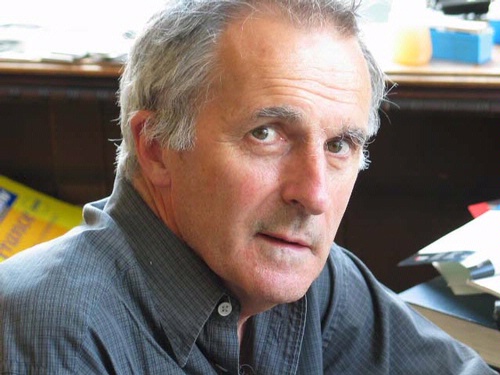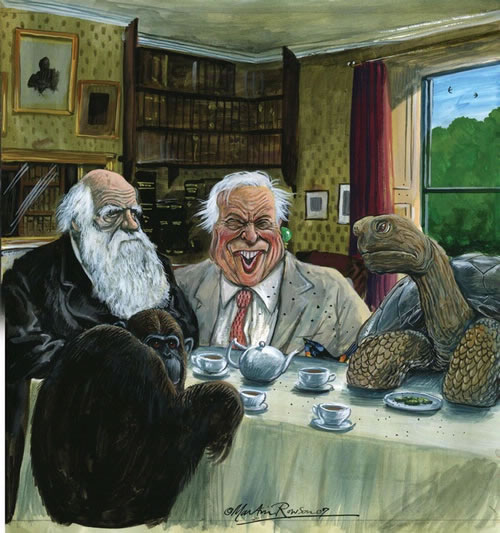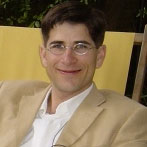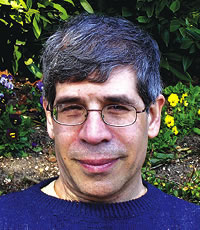 THE GENETICIST
THE GENETICIST
Steve Jones, Professor of Genetics UCL
What would you tell him? I’d tell him that the thing which defeated him all his life, the mechanism of inheritance, had been solved and it didn’t destroy his theory – as he had thought it might – but actually supported it. He was a very rare thing, an honest scientist. Scientists are often extremely unwilling to accept that some of their ideas might be wrong and will go to any lengths to deny that possibility. But when Darwin wrote the Origin of Species he was written to by a Scottish engineer called Fleming Jenkins with what Darwin thought was an absolutely fatal enquiry. Darwin thought that heredity worked somehow by the mixing of the averaging of the blood of the parents. In that case, Jenkins asked, if you have an advantageous character in the blood, how could you ever get it back, wouldn’t it just dilute away? Darwin immediately saw that that was fatal to his theory. He did six editions of the Origin, each one worse than the one before, as he got more and more tangled up and less confident about the basic idea. But he was working with the wrong substance – blood. Inheritance is based not on liquids, as he thought, but on particles: genes. It’s a digital not an analogue system. Genetics confirms Darwin. Of course this is Mendel’s discovery, which Darwin was sent but never read.
 What would you ask him? I would ask him what he thought his illness was. There is endless argument about this. He never discusses what it is, though he talks endlessly about his symptoms.
What would you ask him? I would ask him what he thought his illness was. There is endless argument about this. He never discusses what it is, though he talks endlessly about his symptoms.
The standard claim is that he had chaga’s disease, which is transmitted by blood-sucking assassin bugs in South America. But if you look at his symptoms, vomiting, bloating and so on, it just doesn’t fit. And it came up very suddenly, before he went on the Beagle. There then emerged this rather silly notion that it was a psychological conflict, which seems very unlikely. My theory, for what it’s worth, is that he might have had an ulcer. Medicine wasn’t up to diagnosing it then. We now know that ulcers are not stress or alcohol induced but bacteria, which are easily treatable. It’s funny to think that he could have been cured with a pill and then there’d be no Origin of the Species because he would have been healthy and wouldn’t have sat at Down House and ratiocinated for years.
What would you bring him? I’d bring him my extensive fruit fly collection, as the life-cycle of the fruit fly is a microcosm of the whole process of evolution.
How would you describe the evening? Decorous – after all, he was a Victorian gentleman.
What book would you bring him? Middlemarch. George Eliot dramatises the tension between the new doubting scientists and believers, exactly the world Darwin came from.
Assuming he had a DVD player and electricity, what film would you bring him? David Attenborough’s Life on Earth
 THE HISTORIAN
THE HISTORIANDr John van Wyhe, Bye-Fellow, Christ’s College, Cambridge and editor of Darwin online
What would you tell him? Although he would have thought little about it, and perhaps cared even less, as an historian I would have to tell him about the way the story of his life has evolved over the years. Initially he was the great scientific saint who banished religion from the realms of science, then he was a Freudian puppet reacting to his supposedly tyrannical father (thus “killing God” with his theory of evolution was like patricide), then he was said to have discovered evolution on the Galapagos in a eureka moment when he observed the beaks of the finches, then he was said to have held back his theory for 20 years because he was terrified of the consequences of publishing. At every anniversary a new myth like this appears, none of which has any grounding in the evidence. So what new myth(s) will be invented about Darwin in 2009, the bicentenary of his birth?
What would you ask him? I would ask about his first coming to accept evolution. This is really the great question left to be fully answered and there is little to go on. Only one correspondent ever seems to have asked him if he believed in evolution during the Beagle voyage. Darwin said that as far as he could remember he still believed in the fixity of species but that vague doubts occasionally flitted across his mind. I would ask him to elaborate on these doubts. When exactly did he experience these? Which kinds of evidence most influenced this? Was he at all reluctant to consider evolution a possibility in those early days? Although Frank Sulloway showed some years ago that Darwin did not hit on his theory while on the Galapagos, Darwin wrote a letter home from there which was lost. What was in it? By now he would be very tired and I would be doomed to kicking myself for not managing to ask so many other important questions. Such as: in what year did he stop going to church?
What would you bring him? I would bring my laptop and show him Darwin Online, where we have made his entire life’s work available. (And a copy of one of his books for him to sign)
How would you describe the evening? Fun and fascinating. Everyone who knew Darwin said he was a charming, friendly person - with a good sense of humour and a penetrating intellect.
What book would you bring him? Jared Diamond’s Guns, Germs and Steel. He would be fascinated by the reconstruction of the human past in such detail by synthesising the findings of so many fields over so many years.
What film would you bring him? David Attenborough’s Life on Earth – Steve Jones had the same idea, so Mr Darwin would have two copies.
What would he think of the fact that his ideas and personality are under attack from Intelligent Design and creationism? I doubt he could tell us much we cannot already glean from his writings. He would have regarded people who are not scientific workers as unworthy of notice on questions of nature and how it works. But in a very limited sense Darwin believed in design. He believed that a creating intelligence might have set up the laws of nature that science can discover. As in his lifetime, he would not care what unscientific readers thought of his views.
 THE BIOLOGIST
THE BIOLOGIST
Jerry Coyne, Professor of Ecology and Evolution at the University of Chicago
What would you tell him? So much to tell, and so little time! I’d tell him about all the amazing fossils that have been discovered since the Origin was published: transitional forms that link major groups such as reptiles with mammals, land animals with whales, fish with amphibians. These fossils constitute even more support for evolution – evidence that Darwin never had, although he predicted that transitional fossils would exist. He’d probably be most interested in the group of hominid fossils found in Africa dating back as far as six million years ago. These clearly show our ancestry from apes and completely confirm Darwin’s guarded prediction, made in 1871, that “it is somewhat more probable that our early progenitors lived on the African continent.”
Darwin didn’t know how old the Earth was, but conjectured, based on scanty evidence, that it was millions of years old. He’d be astonished to learn that it is actually 4.6 billion years old, and that life began only a billion years after that. I’d tell him how scientists have determined this fact (radiometric dating), and he’d surely be pleased by the confirmation that there was ample time for all living species to have evolved in the way he suggested.
What would you ask him? I’d take the opportunity to ask him a question that has preoccupied Darwin scholars for decades. As is well known, Darwin and Alfred Russel Wallace presented the theory of evolution by natural selection at about the same time. Darwin found out about their parallel ideas when Wallace sent him a letter and essay from Indonesia, asking for his opinion. The material upset Darwin, who wanted to behave like a gentleman in the face of a simultaneous discovery, but also wanted credit for a theory that he’d been gestating for 20 years. Darwin’s and Wallace’s theories were read together before the Linnaean Society of London on 1 July 1858, and published back to back in their Proceedings. This is one of the most famous coincidences in the history of science, but there is a mystery about its timing.
Darwin wrote to his friend Charles Lyell on 18 June 1858, saying that he received Wallace’s letter and essay that same day. These Wallace materials, however, have vanished from Darwin’s correspondence. This is not so unusual, but scholars studying the timetables of mail ships have suggested, on good grounds, that Darwin actually received Wallace’s material not in mid-June but in May. This means that Darwin may have had an entire month to mull over the coincidence and figure out what to do about it. Some historians have suggested darkly that Darwin used this time to steal Wallace’s ideas, and that The Origin of Species, published in 1859, was not wholly original. This is almost certainly nonsense, but the issue of timing remains.
What would you bring him? Fossils that document dramatic evolutionary change: a cast of Lucy’s skeleton (Australopithecus afarensis) from 3.5 million years ago, showing its intermediacy between an apelike and modern humanlike condition. This would show him that we evolved erect postures before our big brains. And the cast of Tiktaalik, the amphibian-like fish recently discovered by my Chicago colleague Neil Shubin. This fossil clearly shows how fish living in shallow freshwater, with their flat heads, lungs and sturdy fins, were poised to clamber ashore.
How would you describe the evening? Staid but surreal. I would be very deferential before the great man. It would be surreal because Darwin would doubtless have great trouble coming to terms with modern technology (like the digital camera I’d use to have my picture taken with him).
What book would you bring him? At the risk of being self-aggrandising, I’d give him a copy of the book I wrote with Allen Orr, Speciation. It’s a summary of everything we now know about the origin of species. I’d inscribe it to him: “with respect and affection. I hope you enjoy this book I wrote on the origin of species. It hasn’t sold as well as yours.”
What film would you bring him? Sleeper by Woody Allen. Besides helping Darwin cope with having (as Vonnegut put it) “come unstuck in time”, the film would acquaint him with a number of vital issues, including nuclear war, cloning and Jewish humour.
What would he think of the fact that his ideas and personality are under attack from Intelligent Design and creationism? I doubt that he’d get terribly agitated about the persistence of creationism, but he might be frustrated that, after 150 years of accumulated evidence proving the truth of Darwinism, some religious people still refuse to accept it. Of the ID-style argument he famously said: “Ignorance more frequently begets confidence than does knowledge: it is those who know little, and not those who know much, who so positively assert that this or that problem will never be solved by science.”
 THE SCIENCE JOURNALIST
THE SCIENCE JOURNALIST
James Randerson, Science Correspondent, the Guardian
What would you tell him? Prof Jones will tell Darwin about genes; I’d like to go a stage further and tell him about DNA – its elegant helical structure, the way it copies itself and the code consisting of 3-letter DNA words that instructs protein manufacture. Most interesting for him, I think, will be the universality (with some tiny exceptions) of that DNA language throughout all kingdoms of life – from bacteria to elephants. That important piece of evidence supports his notion of a common origin for all life. I think he would be thrilled to see it. It is remarkable that Darwin succeeded with his theory despite not fully understanding the mechanism of genetic inheritance.
What would you ask him? I would like to ask about his personal faith, or lack of it. Perhaps surprisingly for a man whose life’s work did more to challenge religion than anything else in science, it is difficult to find out from his letters and writing what he actually thought about God. People regularly wrote to him asking where his theory left their faith. He always replied courteously and briefly without giving much away. One such reply in 1866 went. “My opinion is not worth more than any other man who has thought on the subject.” One thing is sure. His science did nothing to cement a belief in a creator.
His wife Emma was deeply religious and wrote of a “painful void” that could open up between them because of his religious doubts. And in 1879 he wrote to his friend John Fordyce saying, “In my most extreme fluctuations I have never been an atheist in the sense of denying the existence of a God. I think that generally, and more and more so as I grow older – but not always – that an agnostic would be the more correct description of my state of mind.”
What would you bring him? The ruling from Judge John Jones in the Dover Area School District trial over the teaching of evolution in a school in Pennsylvania in 2005. He would enjoy Jones’ 139-page demolition of the ID argument: “In making this determination, we have addressed the seminal question of whether ID is science. We have concluded that it is not, and moreover that ID cannot uncouple itself from its creationist, and thus religious, antecedents.”
How would you describe the evening? Terrifying. It is not often you get to meet a life-long hero.
What book would you bring him? Narrow Roads of Gene Land by William Hamilton. To my mind, Hamilton is the greatest 20th-century evolutionary biologist for his elegant work on how selfishness at the genetic level can produce cooperation at the individual and group level.
What film would you bring him? Star Wars. Even for a man of Darwin’s intellect there is going to be a lot of new information to take in this evening. The great man’s brain may need some downtime.
What would he think of the fact that his ideas and personality are under attack from Intelligent Design and creationism? It would not surprise him much. He realised the difficulty his ideas presented for someone who believed in a personal god that created the universe. He would probably be amazed that so many people in the most technologically advanced and scientifically literate nation on Earth – the US – are so dismissive of his theory.

